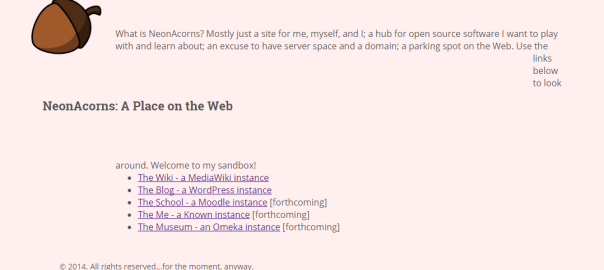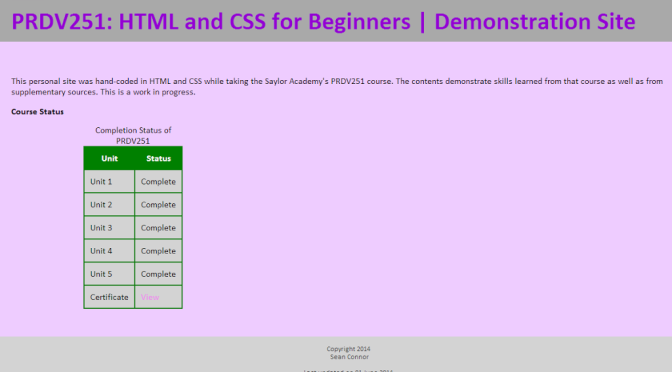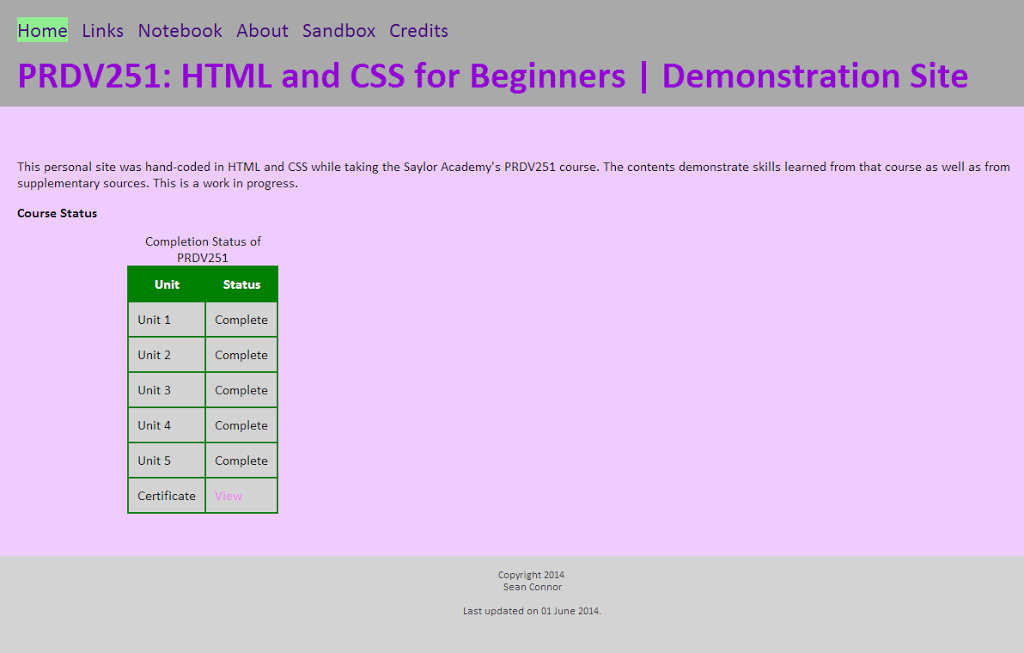Here is an image of the old version of the site, cobbled together with loving care from a basic template. This shiny new WordPress version will usher in a whole new era of experimentation, probably-maybe. It is what will happen around this site that I am most excited about, of course: computers, learning, the Web, and digital culture. Would that the digital Humanities had come into vogue in time for undergrad! Here we are, though, and there is yet time enough.


Learning by doing is…hard
After many, many months of playing with various ways to “roll your own” on the Web — including using Google Drive as a site host, installing a slew of open source scripts to my local machine, and running a few websites from my desktop for an audience of exactly one — I have taken the plunge into a hosted server environment.
What a weekend. The image of the hand-coded index page reveals more of what I cannot do than of what I can. I managed to knock at least some of my server properties out of commission for still-mysterious reasons (but clearing the cache and refreshing the DNS entries at least did not make it worse, whether or not they helped). The past couple of days have held a lot of uncomfortable learning, which is simultaneously the very best and least welcome kind.
At least I accomplished the choosing of a server and the spinning up of this very WordPress blog. Advantages of the server company I chose include “unlimited” this-and-that, a “free” domain renewal each year, and especially monthly billing, so that I can throw in the towel any time I like. Disadvantages, however, include a relative dearth of one-click script installs, the benefits of which are quickly becoming evident.
Environment
- One domain, two sub-domains (so far)
- Apache, PHP…the usual — but no ability to customize the server environment because it is shared
Software
MediaWiki
This is the same software familiar to those who use Wikimedia properties. Configuration is a bit frustrated for a layperson, but using it as an end-user is easy enough. A Wiki is both simple and flexible; achieving that can result in alienating casual users, since “simple” does not necessarily mean “easy”. There is a reward on the other side, however.
WordPress
Still one of the best, and with Jetpack, even a self-hosted instance (like this one!) can take advantage of a bunch of quick integrations — social sharing, Markdown, basic stats, and so forth.
Known
After asking to be one of the Beta kids, and after receiving my invite, I promptly put off signing up until a couple of days ago. Known offers both free and paid accounts, but also is available as an open source script. My attempt to install it — and then trouble-shoot the installation — was unsuccessful, unfortunately; unlike both MediaWiki and WordPress, this script was not a supported one-click installation. Known is social networking that caters to the person rather than to the platform, encouraging both individual ownership and considered openness.
Moodle
Ah, Moodle. Almost as prickly on the back end as MediaWiki, and every bit as robust. I have run this on my local machine, but have yet to try for a proper installation.
Some things that make me sad:
Ghost runs on Node.js and is generally not supported in a shared server environment. Meanwhile, the hosted version offers no freemium. Ghost is a beautiful, elegant, simple, Markdown-driven blog platform, but one that eludes me. At least one WordPress theme mimics the front-facing glory of Ghost, if not the back-end joys, but, alas, does not quite offer the menu I want without PHP fiddling.
Some things that make me happy:
Markdown syntax in the WordPress editor? Nice! Moreover, users of Draft get a small win in being able to create WP posts and pages in the comfy Draft editor and send the content back to WP with a minimum of fuss.
Next up…
GitHub
To be learned!
Known
To be re-attempted!
Omeka
I am a curator without a collection…or am I?
PHP!
Clearly, I will never get anywhere without this…
A Beginner’s Guide to Open Textbooks
I have published a page on open textbooks (which is not to say “open books”); it is available in the blog sidebar and here.
My page is neither the best nor the worst such page you will see, but I do believe it is among the more convenient, dealing briefly with the what/where/why of open textbooks, including:
- What is an “open textbook”?
- Where to find open textbooks
- Problems with open textbooks
- Tools for remixing and re-authoring open textbooks
- Resources for learning more about open textbooks

Achievement Unlocked: HTML and CSS
Today, at long last, I have completed Saylor Academy’s PRDV251: HTML and CSS for Beginners course (CC BY 3.0 wrapper, comprising both open and closed resources).
Whew!
The course requires some light hacking; in particular, figuring out how to use a text editor and browser to create a cohesive website from local files is largely up to the student, but there is no shortage of help available from the Web. In any case, I regard this friction as a good thing, driving learning and retention.
Rather than take notes in an outline format for this course, which is my wont, I decided to create a website that would serve as both sandbox and documentation for what I learned. The result, written in a series of lightweight text editors and published via Google Drive is this:

Where I learn (and what)
 |
| Via here and here. |
Overview
All of the following courses fall under the heading of “free as in beer”. I’m not completely averse to paying for learning; I’ve paid for non-degree Mandarin courses at Northern Virginia Community College and at Graduate School USA (a sort of pretend-sounding name, but love what they do).
The courses below can be divided by whether they constitute OER or not and how course-like they really are. I’m painting with broad strokes; I’ll likely go into detail on some courses in the future.
Full Courses
Saylor.org*
Completed
Ongoing
The Mechanical MOOC
UnCourses
Duolingo
Codecademy
Completed
- Web Fundamentals
- Web (Original)
Ongoing
- jQuery
- Javascript
Workshops
OER-101: Locating, Creating, Licensing, and Utilizing OERs
- I wanted to document and share what I know about OER
- I wanted to meet other people interested in or already working with OER in various contexts
- The course uses Mozilla’s (et al.) Open Badges framework, and I was eager to experiment
- The course is run on Blackboard’s CourseSites platform, which I was curious about
- Something to do!
